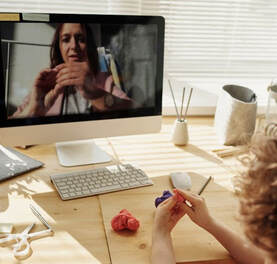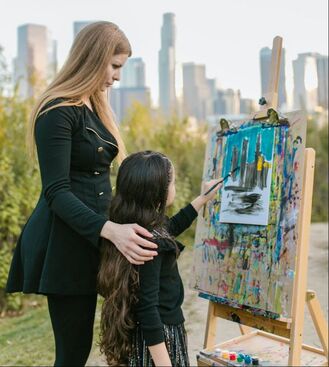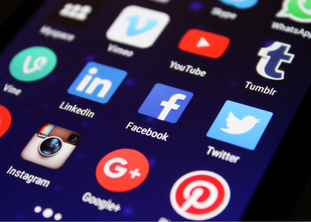|
According to the Bureau of Labor Statistics, only about one-third of businesses survive to their 10th year. We are thrilled here at Leading Tomorrow to have celebrated this milestone this past month! For the rest of this year, we will be highlighting key resources, providing new content, and having special offers to say “thank you” to those of you who have supported and worked with us over the past decade! This month, I reviewed my current Top-10 Picks for Next Gen Resources (see below). I hope you find these helpful! You can also listen to me discuss key takeaways from each resource in this month’s episode of The Leading Tomorrow podcast.
Marching Off the Map by Tim Elmore and Andrew McPeak This book was published in 2017 but continues to be my go-to resource for teaching and training strategies for Gen Z & Gen Alpha. My favorite is the EPIC model — experiential, participatory, image-rich, and connected (relational). This is how young people today learn best! Zconomy: How Gen Z Will Change the Future of Business—and What to Do About It by Jason Dorsey & Denise Villa This is the best book I have found on understanding the workplace expectations and needs of Gen Z. Practical strategies are presented for every step of onboarding a Gen Z team member, from recruiting, to training, to retention. The Culture Translator by Axis This weekly email on what is trending in culture and the lives of teens is gold. For example, did you know that in teen slang “Bop” means a really good song, “Cheugy” means awkward or cringey, and “Finna” means you are going to do something? Axis also has a podcast and many other resources for anyone wanting to understand the music, movies, shows and social media trends impacting today’s youth. Tech-Wise Family: Everyday Steps for Putting Technology in Its Proper Place by Andy Crouch and Amy Crouch My favorite all-around resource on creating a family/home culture that helps manage technology in healthy ways. A great quote from the book states: “Technology is in its proper place only when we use it with intention and care. If there’s one thing I’ve discovered about technology, it’s that it doesn’t stay in its proper place on its own; much like my children’s toys and stuffed creatures and minor treasures, it finds its way underfoot all over the house and all over our lives. If we aren’t intentional and careful, we’ll end up with a quite extraordinary mess.” Another convicting quote: “An awful lot of children have been competing with their parents’ screens for attention their whole lives.” Family Media Plan Tool by the American Academy of Pediatrics This tool walks parents and other family members through a practical list of questions to consider in creating a media plan for the young people in our lives. I appreciate how the template generates good considerations for how to help all of us manage our devices. The Anxious Generation: How the Rewiring of Childhood is Causing an Epidemic of Mental Illness by Jonathan Haidt This one was just released in March of 2024 and is already creating some powerful dialogue regarding how childhood has changed, what young people need, and how adults need to be intentional and unrelenting in creating environments for the next gen that counter the mental health epidemic and related challenges. Kids’ Brains and Screens: A ScreenStrong Student Course by Melanie Hempe Finally, a practical resource for educating and equipping young people to understand the impact of screens on their developing brains and lives. While most resources on technology speak to adults, this curriculum is designed for middle school students and presents information in a fun and engaging way. ScreenStrong has other resources as well. Generations: The Real Differences Between Gen Z, Millennials, Gen X, Boomers, and Silents - and What They Mean for America’s Future by Jean Twenge Dr. Jean Twenge is one of the most noted researchers on generational trends. In this, her latest book, she highlights key factors that contribute not only to the perspectives and behaviors of the youngest generations, but the trends that have impacted all of the living adult generations today. Touch the World Youth & Young Adult Mission Training and Trips Committed to equipping the next generation to live on mission every day, everywhere, Touch the World has some of the best training materials and programs out there for engaging Gen Z in missions. They offer in-person and online training, as well as short-term trips, internships, and a gap year program. Gen SeXYZ: Love, Sexuality and Youth by Jeff Grenell In the opening chapter, Grenell states: “One of the cultural realities of the Millennial and Gen Z sets is that they are living in a real and historic sexual revolution. Maybe the most staggering society-shifting tsunami to ever hit the shores of youth.” He continues to unpack the sexual revolution occurring today and offers practical strategies for anyone mentoring the next generation.
0 Comments
 Despite many schools and work activities being back in person, virtual classes, training, and work meetings continue to be a significant part of our daily interactions, and will likely continue indefinitely. As a result, we must constantly hone our virtual interaction skills. Her are four of my favorite tips for communicating and building relationships in virtual contexts. -Tip 1: “Push” Important Info to Students/Team Members We live in a world where notifications and reminders help us focus on what is important amid the onslaught of information we encounter. As a result, we need to “push” important information to students and colleagues. Extra reminders to team members on upcoming meetings or tasks can be helpful. Students may need support as they navigate online learning. I do this by posting and emailing weekly updates, highlighting what is important in each module. During the first couple of weeks of class, or when there is a new type of assignment or activity, I post/send a special reminder or explanation, even though all this info is also clearly posted online. Students benefit from knowing what to focus on, understanding how to manage their time, and getting information that minimizes mistakes or confusion. -Tip 2: Be Present/Engaged In the online context, students and employees cannot “see” us the way they do in a classroom or office, so we need to be intentional to show we are present and engaged. We can do this by contributing to discussion on forums, liking or responding to comments, and making specific comments unique to each student or participant when responding. I also try to reference student comments or insights when giving video lectures or facilitating discussions to show I am paying attention to what they are saying and doing. -Tip 3: Be Personable/Authentic Being personable online requires us to really express our personality. Including some videos and facilitating live discussions helps convey our teaching style. I always host a virtual orientation the first week of class so we can see facial expressions and hear voices. We can let our personality shine through in videos, posts, and comments by sharing personal fun facts and stories or using emojis. Also, responding to employee or student needs and requests for help with empathy goes a long way toward building rapport. -Tip 4: Connect Individually Learn specifics about each student or team member, reference these, share resources they might find interesting given their interests, etc. I create an introduction forum and ask everyone to post a short bio during the first week of my courses. This helps me learn and remember names and backgrounds. Responding promptly to questions and creating times or opportunities for appointments if students or staff need to connect via phone or video chat communicates you are available to help them.  “Sharenting” is a term that describes sharing about kids or young people online. “Sharenthood: Why We Should Think Before We Talk About Our Kids Online,” is a new book by Leah Plunkett. Plunkett argued that “sharenting” happens any time an adult in charge of a child’s well-being, such as a parent, grandparent, teacher or coach, transmits private details about a child via digital channels such as social media. Some of these activities clearly involve a public share, such as posting pictures of your child on Instagram, or blogging about your kids. Others seem to happen in private, but often end up turning your child into a set of data points, via fertility apps or Amazon wish lists, the use of a Nest cam, or photos stored on a cloud server. Though these platforms and devices aren’t necessarily exploitative, Plunkett argues that they involve adult decisions that accelerate a child’s entry into “digital life.” A struggle for many of us is that we want to share about our kids for family and friends; cute kids are a positive feature on social media as compared to some other types of posts; they get likes and comments which make us feel good; and social media is now part of the world we live in. So, is concern over too much “sharenting” warranted? Tim Elmore shares a story on his blog that illustrates one of the potential dangers of too much “sharenting:” It all started when April, Christine’s youngest daughter, was five years old. Christine knew April would be their family’s last baby and wanted to document each milestone and comical moment of her childhood. By the time she was ten, April was avoiding photo ops; shying away from the camera. By 13, when she had a phone of her own, April witnessed on social media just how much mom had posted on both Facebook and Instagram. She felt violated. Eventually, as a teen, April requested her mom stop sharing photos of her. It was embarrassing and drew sarcasm from her friends. In my relationship with my own kids, I have seen the shyness or embarrassment on occasion that result when they realize I have shared something about them. It has made me realize that no number of likes are worth hurting my relationship with my kids. While kids may not need full agency to dictate what can be shared about them at a young age, we don’t want to violate their trust. It can be difficult finding the balance between honoring and celebrating or sharing, and jeopardizing trust. Another real factor is privacy and security. The BBC reported on a study by Barclays bank estimating that by 2030 nearly two-thirds of identity-fraud cases affecting today’s children will have resulted from sharenting. The bank warned that parents might be "lulled into a false sense of security" and fail to understand that they are making their children "fraud targets" in the future, by publishing so much personal information which will remain online forever. Tim Elmore shares some practical guidelines to consider as we share about our kids, grandkids, or other young people online:
 Clinical psychologist, Benjamin F. Miller, wrote that America was already on track to face a mental health crisis before the COVID-19 outbreak. While many Americans are feeling the emotional toll of the pandemic, Millennials and Generation Z represent particularly vulnerable groups. Many were already suffering from declining mental health. The new normal of social distancing is increasing the loneliness and isolation that so many within these generations are experiencing. Many argue that technology allows us to connect effectively even while separated physically. While this is true, we know that in-person interaction is better for emotional health than virtual connection. Jean Twenge, in her book, iGen addresses this issue. She explains that if virtual connection were as valuable as face-to-face connection, then “teens who communicate via social media and text should be just as happy, be just as likely to dodge loneliness, and be just as likely to avoid depression as teens who see their friends in person or engage in other activities that don’t involve screens.” However, the research demonstrates that, “teens who spend more time on screen activities are more likely to be unhappy, and those who spend more time on nonscreen activities are more likely to be happy….all screen activities are linked to less happiness, and all nonscreen activities are linked to more happiness.” As we consider this research alongside the fact that most classes, church groups, sports practices, even some camps, not to mention almost all social interactions, have been moved to a virtual format involving screens, the potential for increased depression, unhappiness, and loneliness is evident. While technology is undoubtedly a gift during this time, it is not without significant risks. Twenge reports that “the correlation between social media use and loneliness appears across all demographic groups: boys and girls, Hispanics, whites, and blacks, and those both lower and higher in socioeconomic status.” Twenge also reports that “eighth graders who are heavy users of social media increase their risk of depression by 27%, while those who play sports, go to religious services, or even do homework cut their risk significantly” and that “teens who spend more than three hours a day on an electronic device are 35% more likely to have at least one suicide risk factor.” Research by Brigham Young University indicates that loneliness and social isolation may represent a greater public health hazard than obesity and present a risk for premature mortality. Nicolas Kardaras in his book, Glow Kids, explained children between the ages of 10 and 17 today will experience nearly one third fewer face-to face interactions with other people throughout they lifetimes as a result of their increasingly electronic culture, at home and in school. He goes on to explain that “an emotional connection is built, however, when eye contact is made during 60-70% of the conversation…the less eye contact, the less a connection is made.” Our kids, teens, and young adults today desperately need the emotional connection that comes from meaningful face-to-face time. Peter Gray, my favorite researcher on the importance of play, notes a correlation between a decrease in playtime and a rise in major depression, anxiety, and suicide. Gray writes, “If we love our children and want them to thrive, we must allow them more time and opportunity to play, not less.” As we navigate a season where many playgrounds are closed, sports and team events are cancelled, and other activities are being held virtually, we must be vigilant to monitor the mental and emotional health of the young people in our lives. Reduced emotional connection and increased risks for loneliness and depression are serious threats to the well-being of our young people at this time. We must be proactive to find ways to meet their needs for face-to-face interaction, emotional connection, and healthy activity and play in ways that will allow them to thrive.  This past month, I had the opportunity to do several parent seminars on one of my favorite topics, tech-smart parenting. Social media is always a critical part of those discussions. Whether you love it or hate it, Facebook, Instagram and Snapchat are a part of relationships in our society today. The impact of social media is significant not only for youth, but adults as well. I am a writer and researcher, and part of my job is considering the implications of these forms of communication on how we think and interact. However, that does not mean I am exempt from their effects. Recently, I have found myself reflecting on how my social media use influences my thoughts, perspectives, and emotions…and, I must admit, I don’t always like my realizations. While I enjoy social media for its ability to keep me connected to friends and family around the world, inform me of the joys and sorrows of those I love, and provide perspectives from real people, I find myself struggling against some of its influences. It is often difficult to avoid comparing my life to others, being frustrated or disappointed in some posts that I see, being distracted checking updates, and thinking of activities around me for their “postable” value, rather than just completely enjoying moments and interactions. I must admit, there are days that social media takes more from my relationships than it gives. One of the weaknesses of social media is its ability to distance us from real people and their emotions and needs. In a face-to-face conversation, a pregnant friend would be cautious to narrate her pregnancy experiences to a friend who was struggling with infertility or who had recently experienced a miscarriage. We would not celebrate our child’s academic success to a loved one whose child was experiencing severe learning disabilities. Likewise, we wouldn’t brag about new purchases or expensive vacations to a neighbor who had just lost his or her job, or our weight loss and workout routine to a friend who was struggling with health issues. Such behavior is self-centered, insensitive and hurtful. Nonetheless, innocent posts on social media can have the same effect. Of course, the broad audience we interact with via social media makes it hard to always consider individual perspectives and needs, but I think most of us can admit we need to consider others more when we share information. Too often, I post something because it is a point I want to make, something I want to celebrate, or a moment I want to share. While that is not necessarily bad, if my considerations when posting are primarily about me…what I want or how I feel…then perhaps my motives need to be reexamined. Consistently putting my desires or needs first is destructive in any relational interaction, including those on social media. I must ask myself, am I choosing to consider the needs, perspectives and feelings of others? When I share something on social media, what are my goals and who am I thinking of first? While social media is truly a wonderful tool, like any tool, it has to be used well or it can become destructive. We need to be thoughtful regarding the effect social media is having on us and relationships in our lives. Sometimes changes in our habits or perspectives are needed, for ourselves, as well as those young people who are watching us as they learn to navigate healthy relationships and communication with technology. The following was adapted from a post by my good friend, Bill Mann, who writes and speaks on the important topic of inter-generational mentoring. - Jolene Erlacher
Greater love hath no man than this, that a man lay down his life for his friends. John 15:13. Over 60 years ago, my mother told me that you can count your real friends on one hand. I didn’t appreciate her wisdom for a long time, but it’s pretty accurate based on my own experience. And now studies show exactly that: five is the magic number. Of all the things in life that are underrated, I think forming a deep friendship with another person is high on the list. I’ve written posts on how to choose friends, the value of friends and even what real friends do for one another. C.S. Lewis even commented on the need for friends: “The safest road to hell is the gradual one . . . the gentle slope, soft underfoot, without sudden turnings, without milestones, without signposts. This is why it’s so dangerous to do life alone.” Smartphones burst on the scene with the introduction of the iPhone in 2007. After 12 years, we are now getting a look at what havoc it has caused to our relationships. Not surprising (to me, anyway), there has been a decline in true friendships in the past decade. A recent study showed that social media has made most people’s friendships superficial and shallow. Another study of 3,000 adults concurred. High social media use affected both the quantity and quality of friendships. It turns out that our brain limits us as to the number of friends we can digest. The number is 150, including family, according to R.I.M. Dunbar, a Psychologist at the University of Oxford. To have true connection with your closest five, you need to spend time connecting at least once a week. That takes time, which is another limit on relationships. If you love someone or are married, the number drops to 4. For the next 15, you need to connect at least once every month, and once a year for the rest of the 150. Interesting stuff. The takeaway is that the more your spend time on a relationship, the stronger it becomes. Social media doesn’t increase our capacity for friends, and the number stays at 150. While getting “likes” is gratifying, it doesn’t replace face-to-face conversation. In other words, if you have more than 150 “friends” on social media, the number above 150 is meaningless. They are just acquaintances. They are not your friends. Connecting means some kind of back and forth conversation which takes time. Fast forward to today where WhatsApp, Snapchat, texting, Instagram and Facebook have become platforms for interpersonal communication. Jean Twenge, who has researched this area, has noted that FOMO and increased use of social media has resulted in less time hanging out with friends. The result: increased loneliness and isolation. The next generation (18-34) spends upwards of 43% of their digital use on apps, and adults in general spend over half their day interacting with media. For the next generation, that’s 8 hours a day. But what is it getting them? Shallower relationships, superficial friends and often loneliness and depression. Certainly not a friend willing to lay down his life for them. A friend of mine went through a tough patch in his life. He did some pretty bad things which caught up to him. I spent time with him in the aftermath. I told him that the good news was that he would really find out who his real friends were. Those who were shallow would distance themselves and abandon him. He later came to me and said: “You were right; I now know which friends I can count on.” This morning, I chatted with a friend, Steve Noble, who has started meeting with some from the next generation. He asked them a couple of questions. The answers didn’t surprise me. None of them had a close friend that they felt they could call on in need, and none of them ever connected in any meaningful way with someone older. In a challenging article in Christianity Today, Jen Thorn describes the 6 costs of real friendship: Time, personal convenience, intimacy, comfort, love and prayer. This is a biblical view of what real friends do for each other. Lest I forget, every study I’ve seen reports that those who have close friendships tend to be happier in life. Nuff said. I’ve had the good fortune to have close friends, but it has taken effort and intentionality. I’ve met with 2 other men for over 25 years weekly, and we share life together. Proverbs tells us to seek wise counsel, and we have provided each other with invaluable support, direction and feedback through the years. I count my group as a peer mentor group, although we never gave it that label. The challenge here is that the next generation is missing out by not having real friends. They need someone to come alongside and help them understand the importance of friends in their life. Real friends are the people who stick by you in the good times and the bad. MENTOR TAKEAWAY: In your interaction with your mentee, find out who his friends are (or aren’t), and encourage him to develop close relationships. It may be the best advice you can give him. Read the full post by Bill Mann at his blog. |
AuthorDr. Jolene Erlacher is a wife, mommy, author, speaker, college instructor and coffee drinker who is passionate about empowering the next generation of leaders for effective service! Archives
May 2024
Categories
All
|

 RSS Feed
RSS Feed